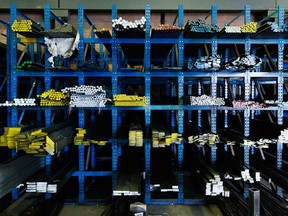Parts of country’s trade policy regarding metals are broken
Article content
In the midst of United States President Donald Trump‘s threat to impose 25 per cent tariffs on steel and aluminum imports from all countries beginning next month, a consensus in Canada is emerging that parts of this country’s trade policy regarding metals are broken.
Article content
Article content
For one thing, Canada is a dumping ground for other countries’ cheap steel, Catherine Cobden, chief executive of the Canadian Steel Producers Association (CSPA), said.
Advertisement 2
Article content
The tariff threats from U.S. President Donald Trump keep coming. This Wednesday, Feb. 19, at noon ET, Financial Post reporters Gabriel Friedman and Serah Louis will be online to answer your questions about the latest developments and how they affect Canada during a live Q&A session. Register here to receive a reminder ahead of the event with a link to the chat.
Dumping is when a foreign company sells a product into another country at an artificially low price, and it can violate World Trade Organization rules. There are also rules about foreign companies exporting products that are priced lower because of government subsidies.
In the past decade, the percentage of offshore steel — meaning from outside North America — consumed in Canada has doubled to around 38 per cent of the overall market, up from 19 per cent in 2013, according to Statistics Canada data supplied by the CSPA.
“We have seen a steady increase in dumped steel,” Cobden said. “This has been a steady build for five to seven years.”
She is urging policymakers to quickly address the situation so there’s less dumped offshore steel in Canada.
Article content
Advertisement 3
Article content
Complaints about either dumping or other unfair trade practices are handled by the Canadian International Trade Tribunal, which can provide remedies such as anti-dumping duties.
But Cobden and others said the process to obtain such a remedy is time-consuming, expensive and sometimes ineffective.
Currently, 53 metal products — from extruded aluminum to cold-rolled steel to copper wire — are subject to anti-dumping or countervailing measures in Canada.
Some of the cases date back years, and companies from a long list of countries, including China, Mexico, Japan and Germany, have faced cases.
“It’s a complex and rather cumbersome practice, and it takes a while,” Lawrence Herman, special counsel at Cassidy Levy Kent LLP, an Ottawa-based law firm that handles trade matters, said. “The problem is trade moves very quickly, and what was designed in the good old days may not be entirely effective today because goods move around the world very quickly.”
He said that although the Canadian steel industry has been successful in bringing these cases, they’re “one-off” cases. Each remedy applies to a specific product made in a specific country, and if the company involved in a case shifts its production to a new country, the remedy may effectively no longer apply.
Advertisement 4
Article content
That creates a “whack-a-mole” dynamic, he said.
Herman estimates that obtaining remedies can take anywhere from months to more than a year, and that the cost of a single case can stretch into the millions of dollars.
“That only allows deep-pocketed companies to bring these cases,” he said. “I’m not sure what the solution is, but it’s become clear that the traditional trade rules are not as effective as they need to be.”
In October, Herman delivered a paper, Closing the National Security Gap: Strengthening Canada’s Trade Laws to Address Emerging Global Threats, at the C.D. Howe Institute that said that Canada needs to amend its import governing legislation to give the government broader authority to respond to trade threats on the basis of “national security.”
He also submitted his ideas to the government in September during its month-long consultation on whether to impose a tariff on Chinese electric vehicles (EVs). In October, the federal government announced a 100 per cent surtax on Chinese EVs and a 25 per cent surtax on Chinese steel and aluminum imports.
But the need to find alternative ways to fix the system has only become more urgent since then, Cobden said.
Advertisement 5
Article content
The U.S. tariffs on steel will lead many countries that had been selling there to look for an alternative destination, and Canada will be an attractive market.
“We’re bracing for a double whammy,” she said. “We’re going to have problems getting (Canadian steel products) into the U.S. market and more unfairly traded imports in our own market.”
The situation, however, is complex. Domestic steel continues to account for roughly 37 per cent of Canada’s overall consumption, but the mix of offshore imports has shifted.
Mexico and the U.S. provided 29 per cent of Canada’s overall steel consumption in 2023, down from 44 per cent of in 2013.
A wide range of countries have filled in the gap. Between 2019 and 2023, Argentina, Brazil, France, Thailand and the United Arab Emirates are among those that significantly increased steel exports to Canada, according to data from the CSPA.
But Eddie Hutchinson, a CSPA spokesman, said there is a concern that some steel is being manufactured in one country, sent to an intermediary country and then exported to Canada.
In November, Canada implemented new rules requiring importers to disclose the “country of melt” in order to gain transparency into the market.
Advertisement 6
Article content
Cobden said the overall problem is that there’s an estimated 600 million tonnes of excess steel production capacity around the world, which has flooded the market.
“You’ve got all this extra steel looking for markets,” she said.
Recommended from Editorial
-

How Trump is pouring gas on the fire of deglobalization
-

Tariffs put steel and aluminum sector in familiar predicament
-

Why electricity will be hard to weaponize in trade war with Trump
Although Canada’s production capacity is roughly equal to its market demand, its product portfolio is not a perfect match for its demand, Cobden said.
With access to the U.S. market — where Canada sends more than half the steel it produces — set to be restricted by 25 per cent tariffs in a matter of weeks, she is urging the Canadian government to consider a suite of measures from implementing its own tariffs to “Buy Canadian” policies.
“I don’t know conclusively where this will end,” Cobden said. “We are actively requesting our government do more. If they address the unfair trade in our market, that gives us a fighting chance to succeed.”
• Email: gfriedman@postmedia.com
Bookmark our website and support our journalism: Don’t miss the business news you need to know — add financialpost.com to your bookmarks and sign up for our newsletters here.
Article content
Canada steel producers decry dumped steel
2025-02-18 11:00:04








